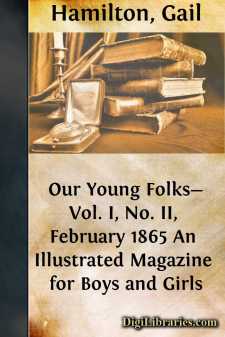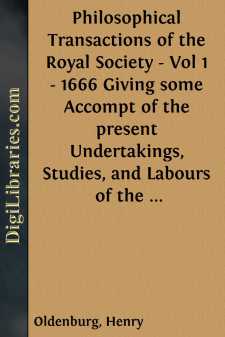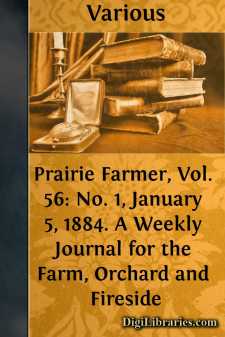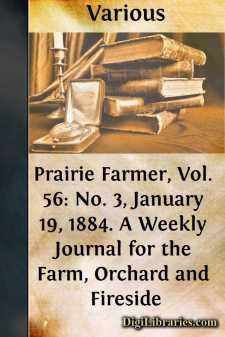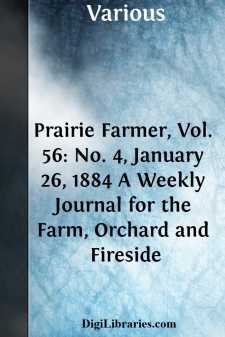Periodicals
- Art 27
- Children's periodicals 59
- Entertainment 5
- Food/Wine 2
- Games/Humor 455
- General 661
- Health 1
- History 53
- House/Home 1
- Regional 62
- Science/Nature 118
- Transportation 10
Periodicals Books
Sort by:
by:
George Bell
ON THE PROPOSED SUGGESTIONS FOR PRESERVING A RECORD OF EXISTING MONUMENTS. The following communications have reached us since the publication of our remarks on the proposed Monumentarium Anglicanum (No. 73. p. 217. et seq.). They serve to show how much interest the subject has excited among those best qualified to judge of the great utility of some well-organised plan for the preservation of a record...
more...
by:
George Bell
The Arke of Artificial Day. Before proceeding, to point out the indelible marks by which Chaucer has, as it were, stereotyped the true date of the journey to Canterbury, I shall clear away another stumbling-block, still more insurmountable to Tyrwhitt than his first difficulty of the "halfe cours" in Aries, viz. the seeming inconsistency in statements (1.) and (2.) in the following lines of the...
more...
by:
George Bell
Notes. ILLUSTRATIONS OF CHAUCER, NO. VI. Unless Chaucer had intended to mark with particular exactness the day of the journey to Canterbury, he would not have taken such unusual precautions to protect his text from ignorant or careless transcribers. We find him not only recording the altitudes of the sun, at different hours, in words; but also corroborating those words by associating them with physical...
more...
by:
George Bell
NOTE UPON A PASSAGE IN "MEASURE FOR MEASURE." The Third Act of Measure for Measure opens with Isabella's visit to her brother (Claudio) in the dungeon, where he lies under sentence of death. In accordance with Claudio's earnest entreaty, she has sued for mercy to Angelo, the sanctimonious deputy, and in the course of her allusion to the only terms upon which Angelo is willing to remit...
more...
by:
Gail Hamilton
DAVID MATSON. Who of my young friends have read the sorrowful story of “Enoch Arden,” so sweetly and simply told by the great English poet? It is the story of a man who went to sea, leaving behind a sweet young wife and little daughter. He was cast away on a desert island, where he remained several years, when he was discovered, and taken off by a passing vessel. Coming back to his native town, he...
more...
by:
Gail Hamilton
HUM, THE SON OF BUZ. At Rye Beach, during our summer's vacation, there came, as there always will to seaside visitors, two or three cold, chilly, rainy days,—days when the skies that long had not rained a drop seemed suddenly to bethink themselves of their remissness, and to pour down water, not by drops, but by pailfuls. The chilly wind blew and whistled, the water dashed along the ground, and...
more...
by:
Henry Oldenburg
The Introduction. Whereas there is nothing more necessary for promoting the improvement of Philosophical Matters, than the communicating to such, as apply their Studies and Endeavours that way, such things as are discovered or put in practise by others, it is therefore thought fit to employ the Press, as the most proper way to gratifie those, whose engagement in such Studies, and delight in the...
more...
by:
Various
Prof. John W. Robson, State Botanist of Kansas, sends The Prairie Farmer an extract from his last report, concerning a tame grass for hay and pasturing which is new to that State. The grass has been on trial on an upland farm for two years, during which time he has watched it very closely. The Professor says, "It possesses so many excellent qualities as to place it in the front rank of all...
more...
by:
Various
Editor Prairie Farmer—I write you in regard to the corn question. I would like to know if angle-worms damage corn. Eight years ago I came to the conclusion that I could raise double the number of bushels of corn that I was then raising. I then commenced experimenting on a small scale. I succeeded very well for the first three or four years. I got so that I could raise over ninety bushels per acre. In...
more...
by:
Various
There are two causes of failure to make this crop uncertain. One is because the soil is not kept clear of weeds, and the other is that it is not properly enriched. To raise a good crop of onions requires a light, loamy soil, worked into as fine a condition as possible, to render cultivation easy. The greater part of the preparation should be done in the fall, and especially the application of the...
more...






